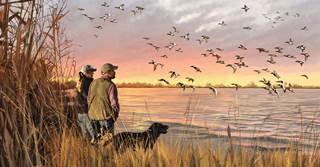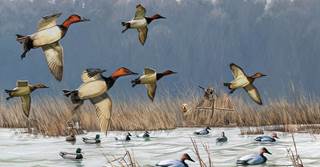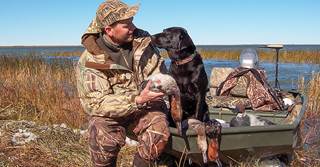A Can for Elsie
A special duck evokes memories of a once-in-a-lifetime hunting companion
A special duck evokes memories of a once-in-a-lifetime hunting companion

By Keith R. Crowley
Illustrations by Dan Burr
It's been 25 years since my wife and I bought a little slice of northwest Wisconsin pine barrens where ducks and deer like to play. When we signed the contract to purchase the 120 acres of mixed wetlands and uplands, we knew we had a fine place to hunt. Ridges of oaks and pines undulated between a small pothole lake and two shallow marshes that hung below the lake like a pair of tattered hip boots. A narrow trickle of water flowed from the lake to the marshes.
We quickly set about making the place even more appealing for critters of all kinds. We put up nesting platforms for mallards and Canada geese, and we replaced some old wood duck boxes that had fallen into disrepair. We even reintroduced wild rice to the lake after one of the locals told us that the rice used to be so thick there that you couldn't push a canoe through it.
But just as the rice started to show some promise, a drought emptied the marshes completely and made the lake nothing more than a mud hole. It stayed that way for three years, until a snowy winter and a wet summer filled it again. But the rice never came back. Someday I'll try again.
The lake itself, never named on any map, encompasses about 40 acres of shallow water. The marshes, with their weedy surfaces and sedgy fringes, take up roughly the same acreage. As brand-new owners of the property, we admired the woodlands and wetlands and knew there would be ducks. We hoped for ruffed grouse and deer and maybe even a bear or two, and we were rarely disappointed. This is where my boys shot their first ducks and their first deer. We left the grouse alone only because we had better places to hunt them.

Photo Dan Burr
As we sat in the duck blind one morning, waiting for a flight that never came, a lone sharp-tailed grouse crossed the lake with stuttered wingbeats and flew directly over the blind. Sharptails are only a remnant species in that country now, although they once lived there by the thousands. There were otters on occasion and fishers and bobcats and wolves to go along with all the prey species. During my fifth deer season on the property a group of four wolves followed me and howled as I walked back to my truck in the darkness. The deer rifle in my hands was little comfort as chills sprinted up my back and I hurried to unlock the truck.
During one of the dry years, we discovered the skeleton of an old wooden duck boat poking up from the dried lake bottom, ribs pointing skyward like the bones of some prehistoric beast. I took that as a good sign, and I imagined a long history of waterfowlers and duck dogs plying the lake's shores.
On opening morning of our first duck season there, we stood on the edge of the marsh and watched hundreds of ducks, mostly ringnecks, mallards, and teal, wheel round and round over the water. We knew we'd done well, but I remember saying to my wife that I would know for sure that we had done right when I took my first canvasback from those waters.
For me, cans have a mystique and a charm like no other duck. I've traveled far and wide in search of the broad-breasted, wedge-faced King Can. To find them on my home waters was a dream that seemed far away.
During the last two and a half decades we've had some fantastic shoots on our property, taking bluebills and redheads on occasion, along with the ubiquitous ringnecks, wood ducks, mallards, and teal. But no cans. I guess the mix of water and vegetation wasn't quite right for the king.

Photo Dan Burr
Some good duck dogs have come and gone over those years too. One dog in particular, Elsie the black Lab, learned her trade on those waters, and I'll never see a dog like her again. The marshlands belonged to her as much as me. When she died, I sprinkled her ashes in the waters of that lake, right in front of the blind.
Last fall everything changed. I crept down to the edge of the lake with another old Labrador, Rosie the Yellow Dog, and we looked for ducks. There were hundreds on the water and in the air, just like the old days. And as before they were mostly ringnecks and wood ducks with a few greenheads and teal here and there. But there was a lot of white on some of those birds bobbing in the middle of the lake. I had neglected to bring binoculars, so I couldn't be sure, but I knew there was a chance. We hurried back to the cabin to assemble some of our wayward ducking gear. I threw a few canvasback decoys into the bag along with the mallard and scaup blocks, just for luck.
The next morning we headed to the same blind Elsie and I had used so many times. Rosie knew the place so well that she ran ahead of me to get there first, sprinting across the hillside covered in oak and jack pine. By the time I reached the blind she was already sitting in her designated spot, watching for incomers. It didn't matter to her that it was still dark and I hadn't even placed the decoys yet. She knew why we were there, and she couldn't wait to start hunting.
As dawn broke, birds started moving. Shots rang out from other nearby potholes, and sizable flocks of ducks traded back and forth from wet place to wet place. We had two bluebills and a Canada goose in the bag when it happened. From far across the lake six birds dropped low over the trees, racing toward our little spread. They were big and fast and there was no hesitation. Gear down, they hissed into the decoys. I stood and fired and watched a drake fall to the water. He came up with his head alert. One more shot finished what I started.
I almost didn't want to believe they were cans, but as the rest of the flock departed, their unmistakable wedgelike heads came into focus. Rosie sat waiting for the command. When I saw that there was no more life in the bird, I sent her.
Time slowed to a crawl as I watched my yellow dog swim out through the decoys and grab the broad-breasted duck. She hurried back as much as an old Lab can hurry. As she neared the fringed shoreline and climbed up onto the matted vegetation, I could see the distinctive profile and subtle color of a drake canvasback.
I was so awed that I almost forgot to grab the camera... almost. In my business it's nearly criminal to forget to take photos. Of course, there are days and times that are meant only for me and my dogs, but this was a moment to share, especially with people who knew about my canvasback dream.
When I took the bird from Rosie the onslaught of emotion caught me off guard. So many memories were attached to that place, those birds, and the dogs. There were recollections of the late spring day when my wife and I stood on the shore of that lake and debated whether to buy the land. Then I thought about that first duck season, with scores of birds winging around the lake and the reedy marshes below it. And I thought of the black Lab puppy we brought home the same year.

Keith Crowley, shown here with Elsie, is a freelance writer and photographer who splits his time between home bases in Wyoming and Wisconsin.
Photo Courtesy of Keith Crowley
Everyone, it seems, has a once-in-a-lifetime dog. Elsie was that dog for us. Rosie is every bit as good in the field, and our previous bird dogs, Briar and Buddy, also knew how to handle themselves in a duck blind, on the prairie, and in the grouse woods. But I had a connection with Elsie that hasn't existed before or since with any other dog. I would have sworn that she could read my mind if I believed in such things. I doubt very much that I'll ever have that kind of innate connection with another dog again. I'll keep trying, of course.
Elsie had retrieved more ducks, especially divers, by the time she turned two than any of our other dogs did in their lifetimes. She brought dozens of canvasbacks to hand on marshes and lakes in Manitoba, and she fought the currents of the Mississippi River to do the same on many a hunt. But she didn't live to retrieve a single can from our home waters.
Now, watching Rosie proudly trot back with the big drake can was almost too much to handle for this old duck hunter. It's hard to believe that a single duck, one of dozens we took that year, could mean so much. But this one did.
Smoothing the russet and slate feathers of the bird, I looked at the skies over our little wetland Valhalla and said aloud, "This one is for you, Elsie." That photo of Rosie, the photo I nearly forgot to take, has a permanent place on our fireplace mantel, there beside photos of Elsie and all the other dogs gone too soon.
Ducks Unlimited uses cookies to enhance your browsing experience, optimize site functionality, analyze traffic, and deliver personalized advertising through third parties. By continuing to use this site, you agree to our use of cookies. View Privacy Policy